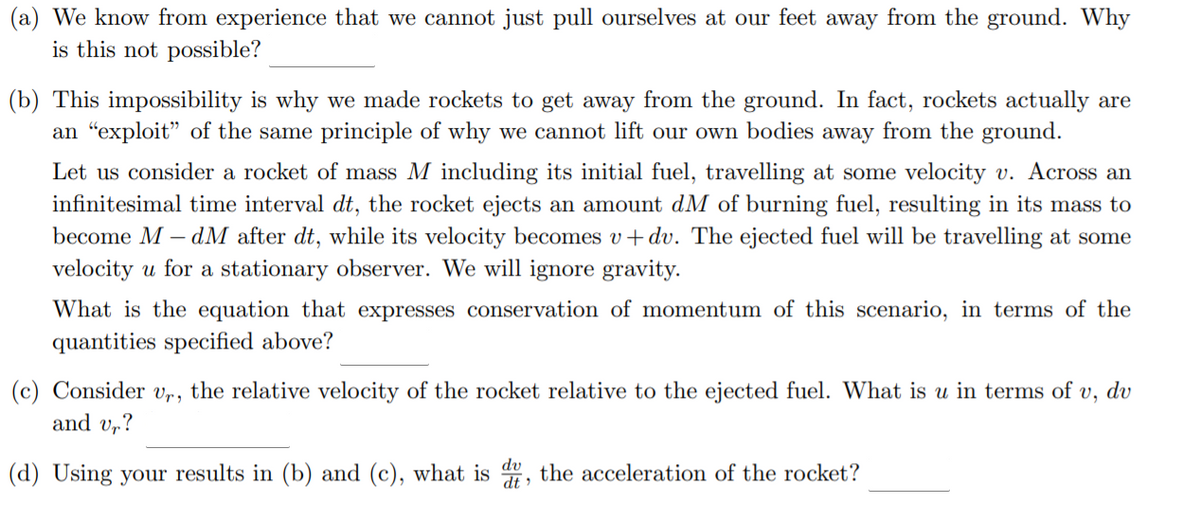(a) We know from experience that we cannot just pull ourselves at our feet away from the ground. Why is this not possible? b) This impossibility is why we made rockets to get away from the ground. In fact, rockets actually are an "exploit" of the same principle of why we cannot lift our own bodies away from the ground. Let us consider a rocket of mass M including its initial fuel, travelling at some velocity v. Across an infinitesimal time interval dt, the rocket ejects an amount dM of burning fuel, resulting in its mass to become M – dM after dt, while its velocity becomes v+dv. The ejected fuel will be travelling at some velocity u for a stationary observer. We will ignore gravity. What is the equation that expresses conservation of momentum of this scenario, in terms of the quantities specified above? (c) Consider v,r, the relative velocity of the rocket relative to the ejected fuel. What is u in terms of v, dv and v,?
Kinematics
A machine is a device that accepts energy in some available form and utilizes it to do a type of work. Energy, work, or power has to be transferred from one mechanical part to another to run a machine. While the transfer of energy between two machine parts, those two parts experience a relative motion with each other. Studying such relative motions is termed kinematics.
Kinetic Energy and Work-Energy Theorem
In physics, work is the product of the net force in direction of the displacement and the magnitude of this displacement or it can also be defined as the energy transfer of an object when it is moved for a distance due to the forces acting on it in the direction of displacement and perpendicular to the displacement which is called the normal force. Energy is the capacity of any object doing work. The SI unit of work is joule and energy is Joule. This principle follows the second law of Newton's law of motion where the net force causes the acceleration of an object. The force of gravity which is downward force and the normal force acting on an object which is perpendicular to the object are equal in magnitude but opposite to the direction, so while determining the net force, these two components cancel out. The net force is the horizontal component of the force and in our explanation, we consider everything as frictionless surface since friction should also be calculated while called the work-energy component of the object. The two most basics of energy classification are potential energy and kinetic energy. There are various kinds of kinetic energy like chemical, mechanical, thermal, nuclear, electrical, radiant energy, and so on. The work is done when there is a change in energy and it mainly depends on the application of force and movement of the object. Let us say how much work is needed to lift a 5kg ball 5m high. Work is mathematically represented as Force ×Displacement. So it will be 5kg times the gravitational constant on earth and the distance moved by the object. Wnet=Fnet times Displacement.
CC: NEed help with the following question. Need help with all the parts

Trending now
This is a popular solution!
Step by step
Solved in 2 steps with 2 images






